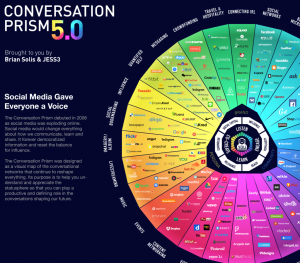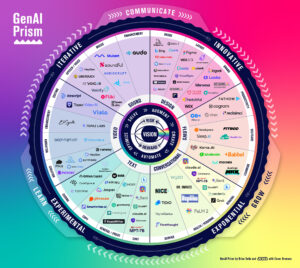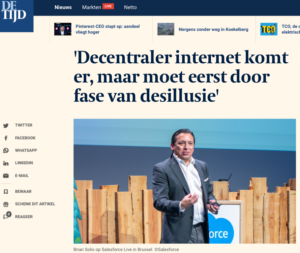
The title of this post is dedicated to B.L. Ochman. I felt that I’d keep up with the spirit in order to convince companies to stop asking questions and accept the fact that they need to engage. The only question they need to ask is,”what do I need to do?”
Good friend Duncan Riley recently asked me to help with an article he was writing regarding PR professionals who also blog and whether or not the companies we work with are ready to embrace the blogosphere.
Duncan is one of the smartest tech, marketing and media-savvy people I know, so I was flattered that I was able to collaborate with him. And his the slogan on his blog is absolutely perfect for this discussion, “Blogging is not a spectator sport.”
Duncan asked, “How would you recommend clients use blogging as part of their PR strategy?”
The easy answer is I would love them to start…
Contrary to popular reports, blogging is far from reaching its tipping point. In fact, it’s hardly done enough in business. In fact, it’s not nearly deployed enough.
Believe it or not, only a small percentage of the companies I speak to are actively blogging and many push back when I present the advantages for doing so. Not only do they push back, but many have the audacity to ask my team to write their posts so that they can put their name on them.
I was sitting next to Shel Israel on a flight recently and we of course immediately jumped into the discussion of blogging. Israel co-authored Naked Conversations with Robert Scoble in 2005 and is considered one of the first books designed to help companies engage in the conversations taking place with or without them.
According to Israel, “We started talking about the subject years ago to help companies start blogging. We thought we failed because, quite simply corporate blogging was not happening right away. Here we are 30 months later, and enterprises are now screaming to learn about blogging and they’re also shocked to find out that you can also embed pictures and video in them. They are finally starting to understand that being shouted out at in the open is better than when they can’t hear them.”
While some are just now getting hot on it, there are also many who still completely underestimate it. It’s still viewed by many as merely an online journal, when in fact, it can be the most powerful, consistent voice for a company, the brand, and its personality ever available to them.
Unlike other forms of traditional marketing, blogging requires new or additional resources to not only create the blog template and platform, but also actively write compelling content using a new voice and also actively participate in the blogosphere to help promote an active and genuine presence.
The challenge initially is to justify and measure the investment against a legitimate and proven ROI model. It just doesn’t stack up or compare to anything most companies do today, so it’s an incredibly difficult first step.
Outside of the tech sector, participating in the greater “conversational marketing” movement is still a foreign and highly misjudged concept. While others simply think that blogging is only an extension of existing marketing using the channel to spew corporate BS in the vain attempts to sell more stuff. Oh, but I can’t forget those company executives that consider blogging a chore. Rather than take the opportunity to share insight and expertise and help consumers make more informed decisions, they instead opt to not blog at all or, as I mentioned earlier, have a PR flack or marketing associate write posts or re-purpose existing content and then post them under their own name.
The truth is that a thoughtful and well-cultivated corporate blog can yield many benefits that not only help PR, but also enhance every facet of corporate communications along with improving sales cycles, customer service and ultimately loyalty.
The best thing any of us can do is create a strong case for why and how companies create a new, or improve their existing, blog strategy. It all comes with a greater respect for people and the honest intent of improving relationships.
In blogging and in all of Social Media, intention is everything.
In order to shape the brand and company personality we wish to portray to customers, reporters, investors, analysts, and anyone who can help the company grow, we must embrace a new level of engagement and stop speaking “at” people, only with them. And it all starts with listening.
As Shel said, it’s about working with companies to realize that there’s more value in listening, participating, and embracing conversations in the public world of Social Media rather than plugging their ears and pretending like none of it is happening.
Blogging requires a true and persevering commitment. You get out of it what you put into it. To quote B.L. Ochman, “Create a totally fucking amazing blog.” Make people read it. Make people value it. Make your peers source it and link to it!
Blogging is about extending a voice, connecting people, and nurturing relationships. This is the only foundation for which any blog strategy should be built.
It is our job and our responsibility to guide them through the uncharted paths of transparency, reminding them that letting go of controlled messages and communications can actually stimulate more conversations and ultimately escalate brand resonance and loyalty.
We’ve all heard that content is king and with blogging, I have to say that simply generating content doesn’t cut it. This is about people talking to people. Sharing expertise, offering advice, offering compassion, defining the landscape, and more importantly, listening to the conversations taking place in and around your brand, and that of competitors, are the necessary ingredients
to effectively participate in the blogosphere.
And it’s not just blogging, it’s actually participating in the community. Company employees can also help people, demonstrate thought leadership, stimulate traffic, and strengthen customer ties by actively reading and commenting on other blogs posts.
Note: I’m not talking about running around and selling people on your products or services. I’m talking about genuinely going out there and joining the conversations that could use your input!
Ultimately, this is all the same advice for PR people as well. There’s no room for pitching, spamming, or the day-to-day BS that defines most PR. With social media, PR is now exposed to the public again and therefore now needs to reengage by putting the “public” back in public relations.
“Opportunity is missed by most people because it is dressed in overalls and it looks like hard work” – Thomas EdisonConnect on Twitter, Jaiku, Pownce or Facebook.
Blogging blog shel+Israel naked+conversations nakedconversations nowisgone naked conversations shel Israel Duncan+riley corporate company marketing social+media social media socialmedia media+2.0 media2.0 2.0 pr2.0 pr+2.0 pr public relations publicity communications public+relations publicrelations Thomas+Edison marketing+2.0 robert+scoble





That’s a ringer, ladies and gentleman. Great post!!!
very very amazing post! your talent to put it down coherently and inspiringly makes the difference! i have some tough pitches when i try to get potential clients involved in social media, but you nailed it with
“Ultimately, this is all the same advice for PR people as well. There’s no room for pitching, spamming, or the day-to-day BS that defines most PR. With social media, PR is now exposed to the public again and therefore now needs to reengage by putting the “public” back in public relations.”
here’s some thoughts from singapore
I find your title very offensive. I recently subscribed to your blog and felt I was plugged into a fellow professional.Believe it or not there are still people in the world who don’t use profanity and don’t care to read it.
Geoff, as always thank you.
Brian, let’s just ditch pitches and focus on the stories that matter to the people reading them 😉
Hazel, I don’t even know how to reply. This is more than a professional perspective…this is a real world sense of frustration over any potential sensationalism than you could possible perceive in this title. It’s not meant to be offensive, it’s supposed to be a depiction of what’s going on in the world of new media PR and what it’s going to take to finally have traditional companies break through. Seriously, read it and understand what it is that we’re missing vs. what we need to do to help companies build relationships in the era of social media.
Move past the headline and read the post – you might learn something. And the goal of the comments section is also for me to learn something as well.
you couldn’t have said it any better
“Note: I’m not talking about running around and selling people on your products or services. I’m talking about genuinely going out there and joining the conversations that could use your input!”
To get through to people today you need a title that cuts through the crap – I loved the title – didn’t find it offensive at all.
I hope this post starts a groundswell of change and opportunity with companies.
I want it proven false that “as a consultant (PR in-house, out of house, or otherwise) you get paid for advice given, not taken.”
Until the under 40 crowd assumes more powerful positions in management at larger companies, status quo (the traditional mass communications approach) will remain. And I say this as a 48-year-old….
Wow! I’m happy to have inspired this great post.
as for being offended by the f-bomb, i say, get over yourself.
BL
Excellent post, and I like the tone–it’s our responsibility to lead them through the wilderness (I think you said transparency), and into the new world and so on. Unfortunately, the enlightened few who try to lead corporate folks to the promise land continue to meet with a lot of resistance and some outright ignorance at the corporate level when it comes to ushering in social media programs. This will be a long process. I sat down tonight and posted some of the top mistakes companies (Big companies) make as they try to make the transition to the new world. I stopped at five but could have gone on much longer. Misunderstanding is still rampant out there. Hopefully these type of articles will help the cause.
As usual, a hugely insightful — and passionate! — post. Certainly those of us in PR have a ton of work to do helping our clients navigate — and see the value in — this kind of communication. I have to think that many of us are firmly on board, working on getting clients there, too. But I have to respectfully disagree with your characterization of PR as largely defined by “pitching and spamming.” First of all, my teams don’t spam — don’t think they’d know how even if they wanted to. Secondly, since when did “pitch” become a bad word? Here’s the reality of the PR pro’s life: we are paid to disseminate information. Many journalist I believe are interested in receiving information — last time I checked. Now, can it be done in an annoying/amateurish/idiotic way? Sure. Is it my job to ensure my juniors know how to engage a journalist in a conversation that benefits them AND benefits our clients? Sure. But just as the smartest PR professionals have embraced social media as a crucial forum in which to inspire — EARN — conversations on their clients’ behalf, so are they continuing to improve their ability to execute with transparency and relevance the most fundamental transaction between a PR pro and a journalist which is…yes…the pitch.
brian, you lost me a little on this one….
What’s the good of asking a company to blog, if that company is not going to use the blog to get feedback from customers? What’s the use of blogging if a company only intends to talk not listen?
These are all questions I’ve been asking myself today. I was thinking about the cluetrain book and its ideas, and thinking about how few companies have actually made the necessary cultural changes to implement its ideas. Some blogging will help, and may not even harm a company, but maybe most social media evangelists should sign a pledge not to sell blogging services unless a company subscribes to making some real cultural changes. That may be a little harsh and in the end something may be learned by implementing a blog but not a cultural change. But I was thinking that really social media evangelists are not technology evangelist rather they a business strategy evangelists. Would you rather be the consultant who advised Dell to change its culture? Or the consultant who advised Wal-Mart to hire a couple of journalists to Astroturf?
tremendous article!! thanks so much!
I don’t know Brian, a lot of corporate blogs are just BORING or downright dumb.